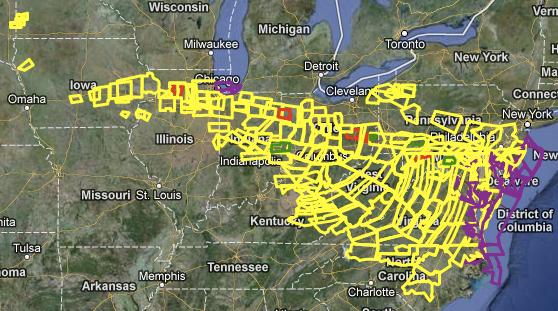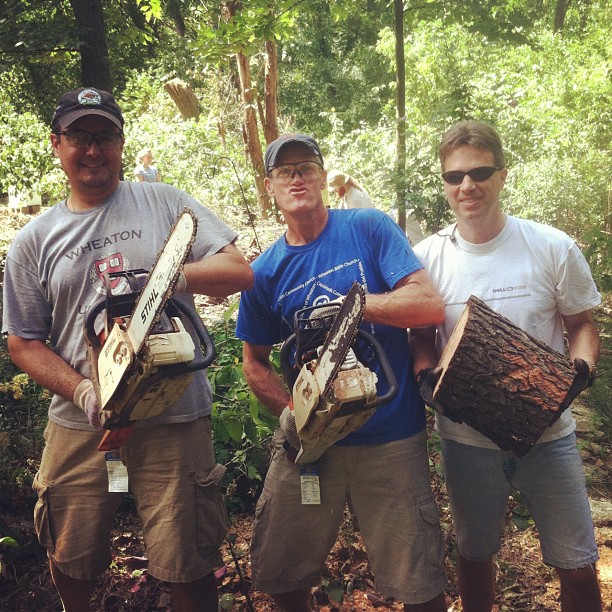Surviving Derechos
The derecho that hit the small community of West Chicago where we
live swept through on Sunday, June 29 around 1:15 in the afternoon,
leaving scenes of havoc in its wake. Some 91-mph winds and torrential
rains destroyed stands of trees, uprooted century-old oaks and tore out
twelve trees on our property alone (others are still leaning and we
suspect they too will fall). The shade gardens we have lived with for
over 35 years are now a sun-loving perennial’s paradise.
Storm damage in the Mainses' back yard
A derecho is from the Spanish word for “straight,” in contrast with the word
tornado,
which is a “twisting” wind. Derechos are wide-stretching, long-lived
straight-line storms that advance forward in bow-like squalls and
expand in width the farther they move with rapidly increasing speeds.
 Storm track of the derecho from the Midwest to the Mid-Atlantic states Storm track of the derecho from the Midwest to the Mid-Atlantic states
Unlike
thunderstorms, which typically can be heard in the distance when
approaching, derechos tend to strike suddenly. Within minutes,
extremely high winds rise—strong enough to blow off roofs, rip apart
siding, upend airplanes and topple giant trees. The June 2012 derecho
caused billions of dollars in damage as it spread from Iowa, across
Illinois and Indiana, on its treacherous way to the East Coast. Some
3.7 million ComEd customers were without power and 22 were left dead.
Complicated by the record North American summer heat-wave, our power
was out for five days. Since David and I were due to meet 16 people in Canada at
the Shakespeare Festival, we decided to leave Monday morning, June 30,
and return the next Saturday, July 7, a week after the storm.
Before
leaving, however, David made a few calls to members of our church and to
our pastor. As it “so happens” Sunday, July 7, a week after the storm,
was our Serve Sunday (we dedicate one Sunday a month to worship God by
serving our community). Due, however, to summer schedules, nothing had
been planned. The small congregation was instructed to give that Sunday
to God in small acts of service and to be directed individually by Him.
“Go on and go up to Canada,” said our church friends to us. “We’ll
rally a group of people to help.”
We had estimated that the
tree-fall damage in our yard alone would take months for us to clear up
by ourselves. “How many people do you think will come tomorrow?” David
asked me on our drive home that Saturday. I was expecting five or six
people.
Imagine our surprise the next morning when 25-30 people showed up,
seven of them eager men with power saws in hand.
By
12:30 the tree fall was cleared; we could walk in the backyard and the
driveway. Debris had been dragged into piles across the street and on
either side of the circular drive (some 12 truckloads in all). The
power-saw crew took off to help neighbors nearby.
 Three of the "power-saw guys" who volunteered Three of the "power-saw guys" who volunteered
David
and I kept looking around our property. We were amazed at the damage,
amazed at the future sun gardens, but mostly we were flabbergasted by
the help from our church family in saving us enormous clearing costs
and getting the work done in such short time so we could concentrate on
working with insurance adjustors, roofers and tree-repair crews.
This
past Sunday, I preached in our little church; we finished up a
series of the I AM sayings of Christ. My assigned topic was from John
15, “I am the true vine, and my father is the vinegrower…” It was
lovely spending the last two weeks living in this passage. Due to the
branch and limb fall in our yard, this verse was especially vivid:
“Whoever does not abide in me is thrown away like a branch and withers;
such branches are gathered, thrown into the fire, and burned.” Verses
1-11, NRSV.
I had actual illustrations of withered branches
strewing my yard. So I gathered baskets of them to haul to church
as an illustration of what we do not want to be.
It occurs
to me, however, when I think of the derechos of all kinds that strike
our lives—real storms, emotional hurricanes, economic collapses—that
not only do we need the Vine Life to be working in us as individual
Christians, we also need to be part of communities of faith where
people are abiding in Christ—together. One of the test of this seems to
be: How ready are we to help one another? How quickly do we set aside
our own schemes and jump to lend a hand to those whose schemes have
been blown to bits?
This Scripture from John, “Abide in me
as I abide in you…” (John 15:1), is written for corporate communal meaning as well
as for individual private instruction.
A derecho hit our
community this summer. Our lovely quiet yard was blasted, but there is
a Vine Life growing among us, and David and I were the surprised but
happy recipients of its vigorous effect. Oh, for a sign to have put beside
our mailbox across the road:
Serve Sunday
The Church at Worship
Helping One Another Along the Way
Karen Mains
NOTICES
The Global Bag Project
This is one of those summers
(maybe because of droughts and derechos) when we are all discouraged in
the Global Bag Project office. Five bag parties were canceled; several
other friends indicated they wanted to help but were not able to clear
their schedules. Consequently, we have not been able to send money from bag sales to our bag-making colleagues in Nairobi.
They have not had work. Mary Ogalo, our Kenya project coordinator, is
tired. Carla Boelkens is tired. Karen Mains is tired. Due to few
sign-ups and unusual obstacles, our Africa trip is falling through and
we are canceling those plans. At this time, we say, “OK. What is God
trying to tell us?”
Perhaps we need partners who have skill sets beyond our skill sets.
Karen
has worked putting together a partnership proposal, which we’ve sent to
several people. We met with one entrepreneur who launched a small
microenterprise that earned millions of dollars and helped workers in
Nicaragua. He told us we were doing a great job and gave us some good
advice, but no practical doors opened. Do you know of anyone who would
like to partner with the Global Bag Project?
Perhaps we need to look at the volountourism idea in a different way.
We
will plan to take a group back to Africa next year, in the fall of
2013. If travelers had more lead time, would they be able to join us?
Should we cut the price? Let us know.
Perhaps we need help to fill the home-party schedule.
The
entrepreneur mentioned above has encouraged us to bring on a lively,
enthusiastic, networked 35-something-year-old who would take over the
home-party schedule for a monthly stipend. Are you someone like this?
Do you know someone like this? Ideally, we should be sponsoring 4-5
home parties per month.
With
the holiday season around the corner, perhaps we need to launch into a
more intentional emphasis on Christmas boutiques and church
international fairs.
Do you know of a bazaar event or does
your church hold an international fair around the holiday season? Or
would you be the contact person for us? Pam Klein, who traveled to
Africa with us last year, launched a neighborhood Christmas bazaar and
with nothing more than an e-mail list, word of mouth, and a rather
ragged front-lawn sign, opened her home for a Friday and Saturday and
cleared a total of $3500 for about five vendors.
If you have suggestions about successful models and can help us with this, we would LOVE to hear from you.
Response to any of the items above will be gratefully received by Carla Boelkens, Global Bag Project Stateside Director, at carla@globalbagproject.com, or by Karen Mains at karen@hungrysouls.org.
Reminder!
The Soulish Food e-mails are
being
posted biweekly on the Hungry Souls Web
site. Newcomers can look that over and decide if they want to
register on the Web site to receive the biweekly newsletter. You might
want to recommend this to friends also. They can go to www.HungrySouls.org.
|
|

Karen Mains
“I had actual
illustrations of withered branches strewing my yard. So I gathered
baskets of them to haul to church as an illustration of what we do not
want to be.”
BOOK CORNER

The Boy Who Harnessed the Wind
by William Kamkwamba and Bryan Mealer
Our
“Read and Intercede” book club took a summer pause, but the book we are
all reading when we come together again for discussion the second
Sunday in September is The Boy Who Harnessed the Wind.
Sometimes when we get tired of the long pull or confused after a series
of distresses, a story like this captures us, amazes us and gives us a
boost to get on with the hard work of what we have planned. A short
quote from the back-cover copy:
“William Kamkwamba was born
in Malawi, a country where magic ruled and modern science was mystery.
It was also a land withered by drought and hunger. But William had read
about windmills, and he dreamed of building one that would bring to his
small village a set of luxuries that only 2 percent of Malawians could
enjoy: electricity and running water. His neighbors called him
misala—crazy—but William refused to let go of his dreams. With a small
pile of once-forgotten science textbooks; some scrap metal, tractor
parts, and bicycle halves; and an armory of curiosity and
determination, he embarked on a daring plan to forge an unlikely
contraption and small miracle that would change the lives around him.”
We
recommend this unusual true story of the capacity of the human spirit,
even under the worst of circumstances—poverty and starvation caused by
a massive drought—to survive and thrive and to bring benefit to others.
The Boy Who Harnessed the Wind is a story about the power of inventiveness.
|




